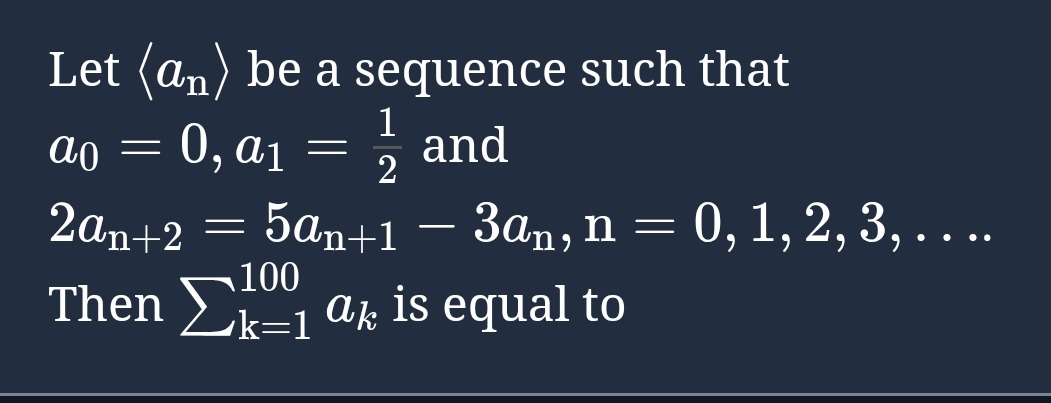Question
Question: Let $\langle a_n \rangle$ be a sequence such that $a_0 = 0, a_1 = \frac{1}{2}$ and $2a_{n+2} = 5a_{n...
Let ⟨an⟩ be a sequence such that a0=0,a1=21 and 2an+2=5an+1−3an,n=0,1,2,3,… Then is equal to

Answer
3\left(\frac{3}{2}\right)^{100} - 103
Explanation
Solution
Solution Explanation:
- Write the recurrence as:
2aₙ₊₂ − 5aₙ₊₁ + 3aₙ = 0 - The characteristic equation is:
2r² − 5r + 3 = 0
Factorizing gives: (2r − 3)(r − 1) = 0, so r = 3/2 and r = 1. - Hence, the general solution is:
aₙ = A(3/2)ⁿ + B(1)ⁿ = A(3/2)ⁿ + B - Use initial conditions:
a₀ = 0 ⇒ A + B = 0 ⟹ B = −A
a₁ = ½ ⇒ A(3/2 − 1) = ½ ⟹ A(½) = ½ ⟹ A = 1
Thus, aₙ = (3/2)ⁿ − 1. - The sum from k = 1 to 100 is:
S = Σₖ₌₁¹⁰⁰ aₖ = Σₖ₌₁¹⁰⁰[(3/2)ᵏ − 1]
= Σₖ₌₁¹⁰⁰ (3/2)ᵏ − 100 - Sum the geometric series:
Σₖ₌₁¹⁰⁰ (3/2)ᵏ = (3/2)·[((3/2)¹⁰⁰ − 1)/((3/2) − 1)]
Since (3/2) − 1 = ½, we have:
= (3/2)·[((3/2)¹⁰⁰ − 1)/(½)]
= 3·[(3/2)¹⁰⁰ − 1] - Therefore, S = 3[(3/2)¹⁰⁰ − 1] − 100 = 3(3/2)¹⁰⁰ − 3 − 100 = 3(3/2)¹⁰⁰ − 103.
